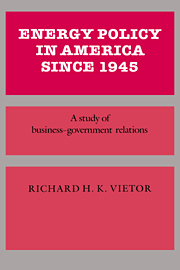Book contents
- Frontmatter
- Contents
- List of charts and figures
- List of tables
- Editors' preface
- Acknowledgments
- List of abbreviations
- 1 Introduction: The political economy of energy
- Part I The transition to peace and fluid fuels, 1945–1958
- Part II Managing surplus through the politics of stasis, 1959–1968
- Part III The second energy transition: adjustment to depletion, 1969–1980
- Index
Editors' preface
Published online by Cambridge University Press: 13 October 2009
- Frontmatter
- Contents
- List of charts and figures
- List of tables
- Editors' preface
- Acknowledgments
- List of abbreviations
- 1 Introduction: The political economy of energy
- Part I The transition to peace and fluid fuels, 1945–1958
- Part II Managing surplus through the politics of stasis, 1959–1968
- Part III The second energy transition: adjustment to depletion, 1969–1980
- Index
Summary
While the United States has had a series of public policies related to energy sources since the nineteenth century, the general public has only become aware of and concerned about these policies in the years since World War II. The reason for this neglect is that for most of our history we have been an unusually energy-rich nation. The major thrust of policy was to encourage private entrepreneurs to convert natural resources into commercial products as rapidly as possible. When, on occasion, surpluses pushed prices down too far, our twentieth-century government intervened to stabilize energy prices, but these programs were only of great interest to those groups directly involved in developing the resources.
When, however, conditions of surplus gave way to shortages of vital energy sources – as has been the case in recent years – most Americans became very concerned about federal policies in the energy field. Unfortunately, there were few reliable, scholarly accounts to which they could turn for an accurate description and balanced analysis of how those policies had evolved in the years since 1945. Now they can read Richard Vietor's penetrating study of Energy Policy in America since 1945. As editors of the series Studies in Economic History and Policy: The United States in the Twentieth Century, we are especially pleased to publish this survey of political developments in the field of energy. As Vietor demonstrates, public policy failed when it became unresponsive over the long term to market forces.
- Type
- Chapter
- Information
- Energy Policy in America since 1945A Study of Business-Government Relations, pp. xiii - xivPublisher: Cambridge University PressPrint publication year: 1984

